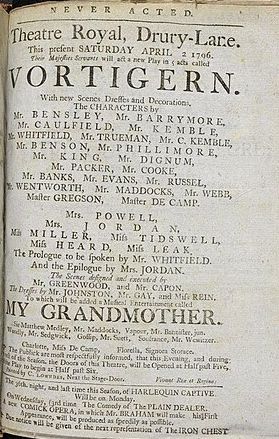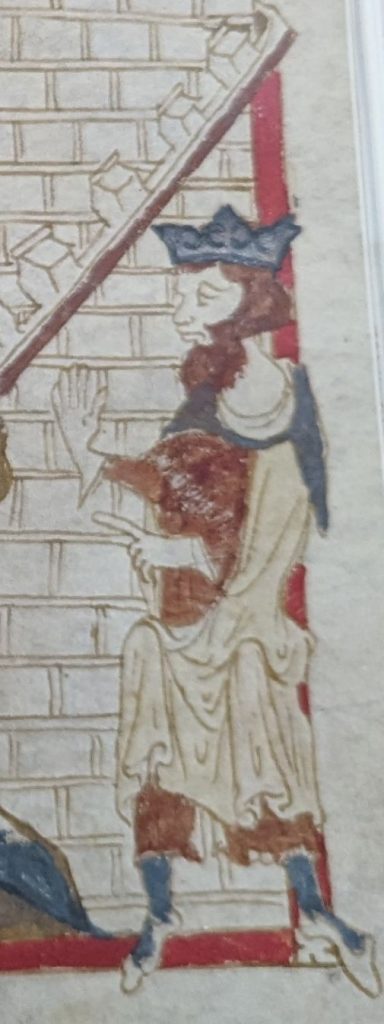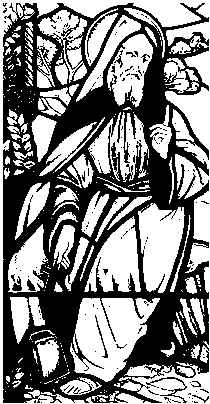
Drawing of a Stained glass window depicting Saint Beuno. D A R C 12345 – Own work
Today is St Beuno’s Day. St Beuno is also known as St Bono. He was an 8th Century Welsh Abbot of some power. The grandson of a prince of Powys in Wales who was descended from Vortigern. (see my post on Vortigern here.) Vortigern was a predecessor to King Arthur. Beuno was educated in Bangor Monastery, one of the foremost Celtic monasteries in Wales. During his ministry he restored 7 dead people to life including St Winifred (or Winefred).
Winifred & St Beuno
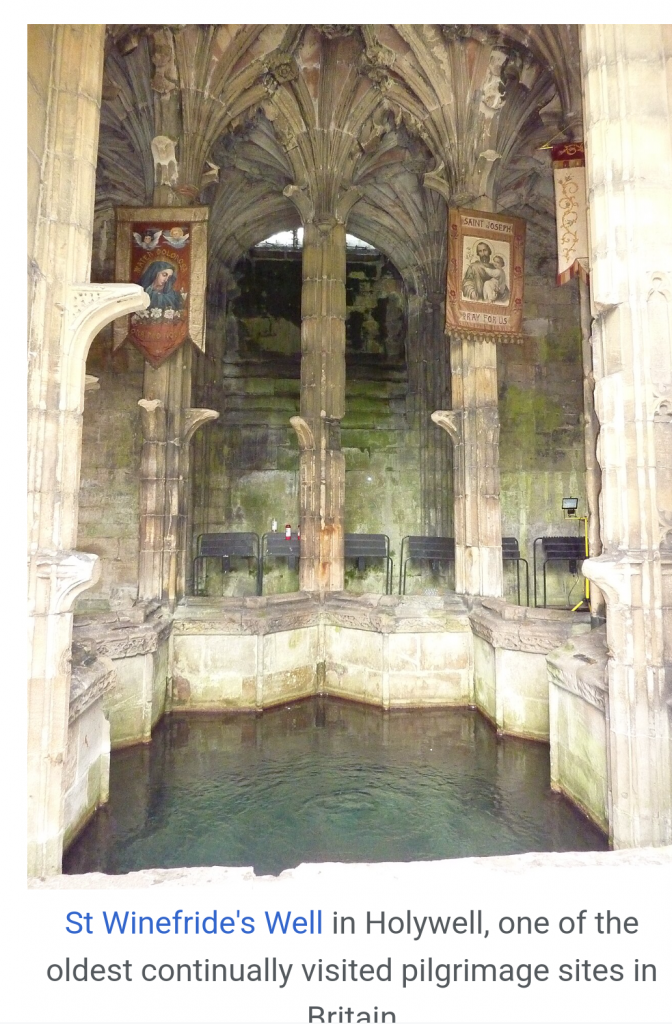
She was Beuno’s niece, a virgin who refused the advances of a certain Caradog. Furious at her taking vows, Caradog tried to seduce her, but she refused. So, he chopped her head off.
Where her head landed a spring sprung amd became a holy spring. The spot, in Flintshire is still called Holywell. It has been described as the Lourdes of Wales and one of my tours go past it that is how I heard about St Beuno.
Anyway the story goes that Beuno put his niece’s head back on her shoulders and restored her to life. How he did that, is a mystery.
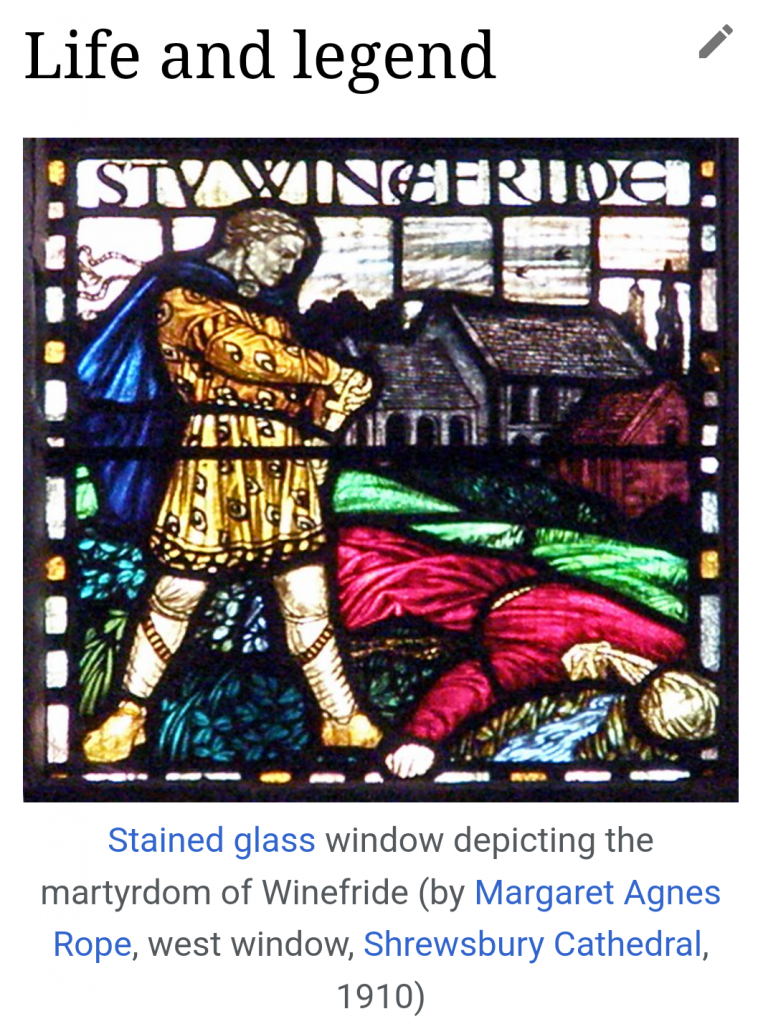
She lived a full life with a brilliant Church career. Of course she is the patron of those who have suffered unwanted advances (but believe me there are many other candidates for that particular honour amongst the female Saints! Have a look at my post on St Agatha for another example of male sexual abuse.
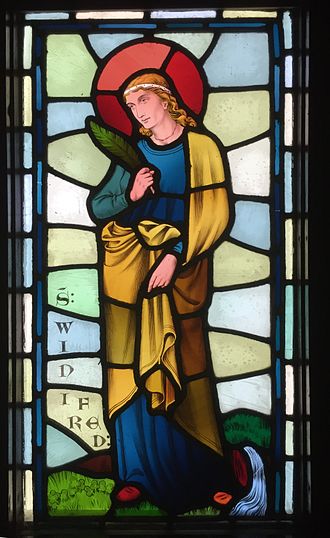
More on St Winefride’s on her feast day on 3rd November.
Medieval Powys, & Neglected Parts of the Female Anatomy
I drafted this in January, when I came across a reference to St Beuno in a fabulous exhibition at the British Library. The show was called ‘Medieval Women – In their own Words’.
On display amongst the many wonderful manuscripts and books of the 11th – 15th Century was a Welsh poem. The author was Gwerful Mechain (1460–1502), the only female medieval Welsh poet with a surviving and a substantial body of work. She is known for her erotic poetry, in which she praised the vulva among other things.
What is extraordinary is that I should, by complete chance, be publishing this the day after posting about the statue of the erect Minotaur! So, you can see how even-handed I am?
Here it is in full, in a modern translation:
To the Vagina by Gwerful Mechain
Every poet, drunken fool
Thinks he’s just the king of cool,
(Every one is such a boor,
He makes me sick, I’m so demure),
He always declaims fruitless praise
Of all the girls in his male gaze.
He’s at it all day long, by God,
Omitting the best bit, silly sod:
He praises the hair, gown of fine love,
And all the girl’s bits up above,
Even lower down he praises merrily
The eyes which glance so sexily;
Daring more, he extols the lovely shape
Of the soft breasts which leave him all agape,
And the beauty’s arms, bright drape,
Even her perfect hands do not escape.
Then with his finest magic
Before night falls, it’s tragic,
He pays homage to God’s might,
An empty eulogy: it’s not quite right:
For he’s left the girl’s middle unpraised,
That place where children are upraised,
The warm bright quim he does not sing,
That tender, plump, pulsating broken ring,
That’s the place I love, the place I bless,
The hidden quim below the dress.
You female body, you’re strong and fair,
A faultless, fleshy court plumed with hair.
I proclaim that the quim is fine,
Circle of broad-edged lips divine,
It’s a valley, longer than a spoon or hand,
A cwm to hold a penis strong and grand;
A vagina there by the swelling bum,
Two lines of red to song must come.
And the churchmen all, the radiant saints,
When they get the chance, have no restraints,
They never fail their chance to steal,
By Saint Beuno, to give it a good feel.
So I hope you feel well and truly told off,
All you proud male poets, you dare not scoff,
Let songs to the quim grow and thrive
Find their due reward and survive.
For it is silky soft, the sultan of an ode,
A little seam, a curtain on a hole bestowed,
Neat flaps in a place of meeting,
The sour grove, circle of greeting,
Superb forest, faultless gift to squeeze,
Fur for a fine pair of balls, tender frieze,
A girl’s thick glade, it is full of love,
Lovely bush, blessed be it by God above.
From: Gramich, Katie, Orality and Morality: Early Welsh Women’s Poetry, 2005, Cardiff University: Cardiff, pp. 8-9.
(http://www2.lingue.unibo.it/acume/acumedvd/Essays%20ACUME/AcumeGramichfinal.pdf)
Date: c1480 (original in Welsh); 2003 (translation in English) By: Gwerful Mechain (1462-1500) Translated by: Katie Gramich
For more about St Beuno https://en.wikipedia.org/wiki/Beuno
First published on April 20th 2025

